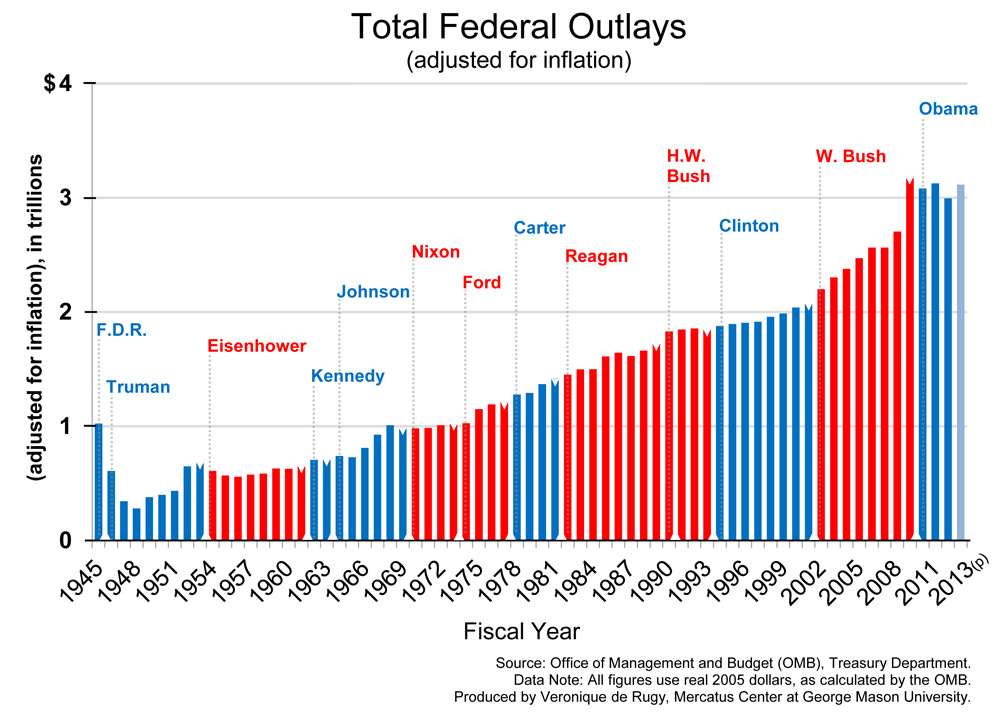If You Think the Sequester Cuts Will Tank the Economy, I've Got a Bridge In Brooklyn You Might Want to Buy

Or some prime real estate in Florida. Really, it's not swamp land at all. And those aren't alligators, they're dogs.
Our story thus far: Back in August 2011, as a condition of raising the debt limit by as much as $2 trillion, Congress and the president agreed to cut about $900 billion in anticipated spending. They also created a committee that was charged with coming up with an additional $1.2 trillion in cuts over the next decade to expected spending by the end of 2011. If Congress didn't pass those cuts, then come January 1, 2013, automatic cuts - a sequester - would kick in, split between defense spending and non-defense discretionary (with a light sprinkling of some even smaller cuts to entitlements). Congress failed to pass anything and then, when the 2013 deadline arrived, it pushed the deadline for the cuts to start to March 1.
Widely quoted as $85 billion for spending in fiscal year 2013 (which ends on September 30), the Congressional Budget Office (CBO) underscores that just $44 billion of spending reduction are slated for 2013, with the rest coming in later years. So what we're talking about is trimming $44 billion from total federal spending expected to be $3.6 trillion this year. If you use the $85 billion number, that's about 2.4 percent of the budget. If you use the $44 billion, you're looking at 1.2 percent.
For The New York Times, the sequester signals "an era of government austerity." For the White House, it's the end of the world. As USA Today reports, President Barack Obama has made it clear that everything from unemployment insurance to school lunch programs to cops on the beat will be scaled back.
In his weekly Saturday radio address, Obama said the cuts will slow the economy, eliminate jobs and "leave many families who are already stretched to the limit scrambling to figure out what to do."

The unkindest cut? Energy Secretary Steven Chu has revealed that sequestration would reduce the number of houses being "weatherized" by the feds by "more than a thousand."
We should try to define austerity. In its latest budget document, the CBO notes in table 1-1 (look at outlays) that, assuming sequestration happens, there will be a slight dip from 2012 to 2013 in discretionary spending levels. Then discretionary spending rises every year through 2023. Total federal spending is projected to rise from $3.5 trillion in 2012 to $5.9 trillion in 2023. Good luck matching that sort of austerity in your salary gains over the next decade.
Here are three questions for folks wetting their pants about the sequester:
1. Under what sort of math do you figure that cutting $44 billion or $85 billion from a total tab of $3.6 trillion is anything more than a rounding error? Half of the cuts are slated for defense spending, which has grown massively over the past decade-plus. Do you really think that the military can't cope?

2. Do you really believe that the sequester cuts will tank a $16 trillion economy? And if so, what's the multiplier on that? GDP is counted in such a way that most government spending automatically gets counted as increasing the amount of economic activity (the same doesn't hold for private spending, where different conditions hold). Do you at least agree in theory that government spending has been cut in the past without ruining the economy (and if you don't, why not)?
3. When will conditions be right to actually cut spending? There's a raft of anti-sequester people - such as Barack Obama - who pay lip service to the idea that government spending (especially government deficit spending) needs to stop or be reduced at some point in the future. But like St. Augustine in his partying period, they don't want to get straight just yet. So when might that be? If we can't afford to cut a tiny fraction of current spending now - after a year-plus of knowing this was coming and a major punting on the original deadline - when might we?


Show Comments (102)